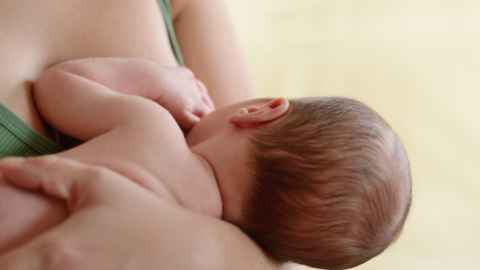Words by Carrie Leonetti, Associate Professor from the Faculty of Law, Auckland University.
Photo by Tingey Injury Law Firm on Unsplash
That judges and lawyers feel comfortable interfering in the intimate relationship women have with their bodies and babies in breastfeeding is emblematic of a larger cultural problem.
When I researched Family Court judgments, I found cases in which women were told they either needed to express their breastmilk and provide it to fathers or wean their young children before they wanted to. One (male) judge asks women if they are willing to express breastmilk so their children can go into shared care sooner. If they say yes, they are ordered to do so. If they say no, he finds they are using breastfeeding as an “excuse” to frustrate the father’s right of access to his child.
I can’t believe I need to write this in 2023: Dear Family Court Judges, women are not dairy cows.

I have been contacted by mothers whom the Family Court has ordered to stop breastfeeding young children. They have been told shared care is more important than nursing, so they must wean their children to enable fathers to have equal time with them.
Ordering women to wean children because it is more important that fathers get equal time with them is particularly incredible given the decades-long public health campaign to encourage women to nurse and for longer periods. The World Health Organization recommends women breastfeed children for at least two years. They campaign to get countries to adopt social and legal policies to achieve that goal.
The court’s response is to insist there is no real ‘nutritional’ value to nursing in comparison to bottle feeding. Actually, that is right. There is little nutritional benefit to children being nursed past six months. Commercial formulas are highly nutritious and contain supplemental nutrients not in breast milk.
It is shocking that court personnel invade one of the most personal decisions that women make – whether, when, and how long to breastfeed.
The primary benefits of nursing are immunological, biochemical, and psychological. Breastmilk contains immunoglobulin and white blood cells. Breastfeeding produces healthier immune systems in children and reduces women’s risks of breast cancer. Nursing causes mothers and babies to produce a neuropeptide known as oxytocin, the hormone of human bonding. It reduces stress, enhances wellbeing, and facilitates emotional attachment. The skin-to-skin contact of breastfeeding spurs emotional bonding and reduces production of cortisol, a stress hormone. Mothers who breastfeed develop better emotional responses to children, and breastfed children have higher IQs than bottle-fed children. Breastfeeding mothers are doing much more than producing milk.
It is shocking that court personnel invade one of the most personal decisions that women make – whether, when, and how long to breastfeed. That judges and lawyers feel comfortable interfering with this intimate relationship women have with their bodies and babies is emblematic of a larger cultural problem: lack of respect for motherhood. The court appears to be ignoring the reality of the division of childcare in most heterosexual relationships to advance a social agenda.
I am a feminist. I wish men and women shared equally in the emotional and physical labour of raising children, but they don’t. Women remain the primary carers of children in most relationships. They are largely the ones who read the books, sing the songs, pack the lunches, help with the school projects, drive the carpools, apply the plasters, and nurture their kids through the emotional minefield of adolescence. Sociologist and writer Arlie Hochschild termed it working the “second shift”.
Women still earn about 15 percent less than men for the same jobs, and much of the wage gap comes from employers’ stereotypical expectations that women will not be as available due to caretaking responsibilities. Women who are married live shorter, less healthy, less happy lives than women who are single. Men who are married live longer, healthier, and happier than men who are single. Heterosexual marriage is, statistically speaking, a long-term transfer of labour and wellbeing from women to men.
When women leave these relationships, they are punished again by a court that refuses to see the value of their disproportionate contributions to the care and nurturing of children. Treating women like babysitters and milk dispensers to be pushed aside when fathers demand their ‘right’ to parent demonstrates a callous disregard for the value of mothers, and it is kids who suffer.
If we want to reform the division of labour in heterosexual relationships, we should adopt policies that encourage equal sharing of parenting in intact relationships, not force children whose parents have separated to be guinea pigs in a social engineering experiment based on a spurious understanding of “equality”.
Young children whose mothers are incarcerated have the right to reside in special prison units with them until they turn two. The purpose of the Corrections (Mothers with Babies) Amendment Act establishing that right is “to provide for the best interests of the child by enabling young children of female prisoners to be placed with their mothers in prison until they turn 24 months old, for the purposes of bonding, feeding, and maintaining continuity of care”.
If it is in the best interest of an 18-month old to live in a correctional facility to bond and be breastfed by their mother, how is it not in the best interest of an 18-month-old in the Family Court to remain in the care of a breastfeeding mother? One factor the court is supposed to consider in determining children’s best interests is “continuity of care”, but in practice this factor carries little weight.
Parental separation is already traumatising for children. Ripping children from primary carers to whom they have strong emotional attachments and forcing them into the shared care of secondary carers adds to this trauma. Doing this to advance an ideological agenda about gender equality is cruel.
Formal concepts of equality do not necessarily lead to meaningful equality. Football stadiums have equal numbers of men’s and women’s restrooms, but what happens at half time? Lines of women stacked up to the merchandise booth, and a half empty men’s room. Why? Because it takes a lot longer to sit down in a stall than to stand at a urinal. An equal number of bathrooms does not achieve urinary equality.
Judges often scold that “women are not inherently better parents” or “mothers are not automatically entitled to primary care of children”. With all due respect to the court, duh. Respecting the difference between primary and secondary attachment figures is not gender discrimination. It is a gender-neutral principle that has a gendered impact only because women usually perform the lion’s share of parenting. If we want to reform the division of labour in heterosexual relationships, we should adopt policies that encourage equal sharing of parenting in intact relationships, not force children whose parents have separated to be guinea pigs in a social engineering experiment based on a spurious understanding of “equality”.
The court pretends mothers and fathers are equal carers of children because they want them to be. What better example of the gap between reality and ideology could there be than a judge ordering a mother to stop breastfeeding so a father can exercise his right to bottle feed?

